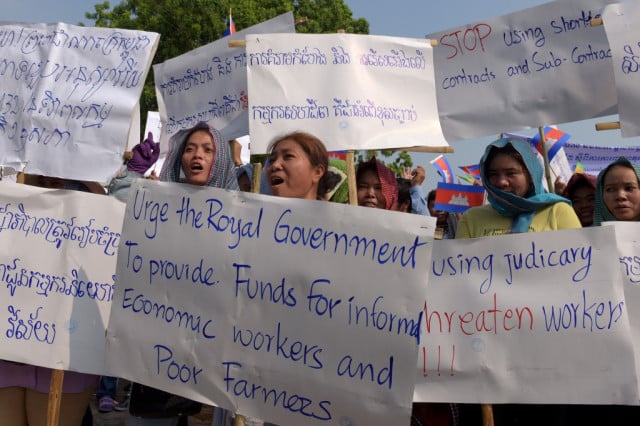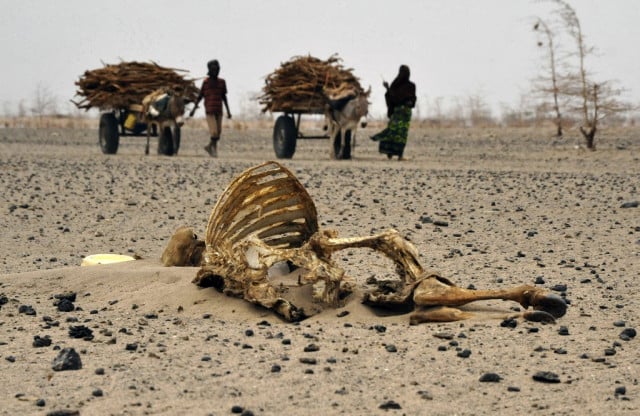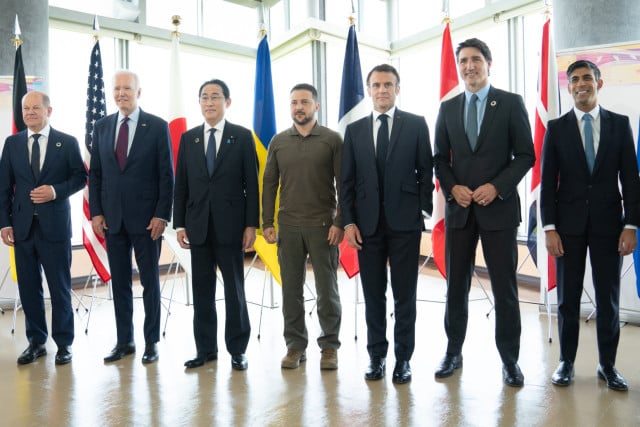Trade Unions and Civil Society Ask PM Hun Sen’s Support for Workers

- Phoung Vantha
- May 1, 2021 1:59 PM
Just hours prior to their letter sent on International Labor Day on May 1, Hun Sen had announced that garment and tourism workers’ monthly payments will be extended till June
PHNOM PENH--Cambodian trade unions and civil society organizations marked the 135th International Labor Day on May 1 by sending a letter to Prime Minister Hun Sen outlining the current situation of workers in the country, noting the programs the government has implemented to help them during the pandemic, and requesting specific measures to resolve labor issues such as using government mechanisms in place instead of taking them to court.
A few hours earlier on May 1, Hun Sen had a 5-page message posted on his Facebook page in which he said that the government would continue to support garment workers suspended due to COVID-19 by providing them with $70 per month until June—with $40 coming from the government and $30 from factory employers.
Moreover, suspended workers in tourism-related businesses, including hotels, guesthouses, restaurants, and travel agencies will receive monthly payments of $40 until June, he said.
As the letter of the trade unions and civil society organizations explained, “[t]he COVID-19 pandemic, and in particular the recent [Feb. 20] outbreak, has been devastating for Cambodian workers.
“Garment workers at more than 200 factories have tested positive for the virus,” the letter read. “Tourism sector workers in provinces such as Banteay Meanchey, Svay Rieng and Battambang have been excluded from Government allowance programs, despite the Ministry of Tourism specifically acknowledging the hardships they’ve faced.”
And the current lockdown and restrictions following a surge in COVID-19 cases due to the Feb. 20 community outbreak have made the difficult situation even worse, with many workers having a hard time paying for food and rent, the letter read. In addition, some financial institutions have not implemented measures to help borrowers cope with payments they cannot make.
However, the letter said, “[t]he Government’s response to the pandemic should also be noted. More than 320,000 workers have received Government allowances during periods of employment suspension, a program that can be used as a model for further social protection programs in Cambodia.
“Most disappointing of all, though, has been the responses of many employers and international brands in the textile industries to the pandemic,” according to the letter. “Often, employers have sought to capitalise on the crisis by calling for and implementing wage cuts, instituting mass lay-offs and targeting independent trade union leaders and activists.
“Brands, meanwhile, cancelled orders and demanded both reduced prices and delayed payment terms,” the letter read. “In both 2020 and 2021, seven Cambodian textile union federations sent letters to more than 40 international brands, calling on them to better support workers during the COVID-19 pandemic; all refused.
“The refusal of international brands in the textile sector to provide any meaningful aid to Cambodian workers reflects a broader trend of brand inaction during the pandemic,” the letter stated. “They have consistently failed to intervene in cases involving the dismissal, discrimination or harassment of independent trade union members, leaders and activists.”
Labor disputes should be handled by the Arbitration Council, not the court, the letter to Hun Sen says
In the meantime in Cambodia, the letter continued, “the number of cases heard by the Arbitration Council have dropped by more than 40 percent as Ministry of Labour and Vocational Training officials repeatedly exceed their legal mandate and refuse to forward collective labour disputes to the Arbitration Council for resolution.
“The undermining of the Arbitration Council has been effected by the Ministry of Labour, or in some cases, individual officials, issuing regulations and letters on various matters, which go against long-established Arbitration Council interpretation,” the letter read. Some proposed amendments to the Labour Law in Cambodia would cut night workers’ wages and take away a number of public holidays, according to the letter.
Among requests listed in the letter, the first one is that the amendments to the Labour Law planned by the government be dropped, that a “genuine tripartite dialogue” involving the government, the private sector and independent trade unions be held, and that the project of a labor court be dropped.
The last request is that the COVID-19 tests of workers at private clinics approved by the Ministry of Health be covered by the Cambodian government healthcare system.
One point of contention among some unions and employers have been seniority allowances that some firms failed to pay. In his letter on May 1, Hun Sen addressed the issue and ordered the re-implementation of payments for pre-2019 seniority and 2020-2021 seniority allowance for workers in textile, garment and footwear enterprises.















